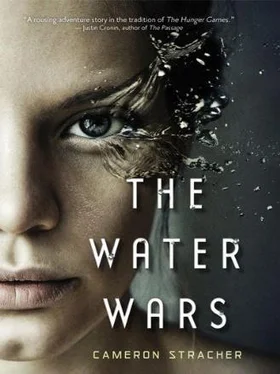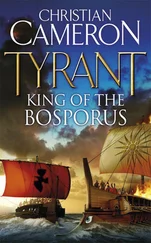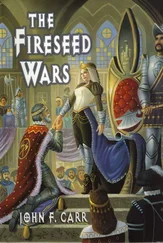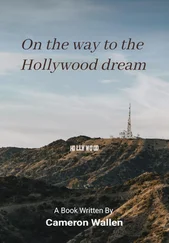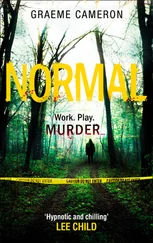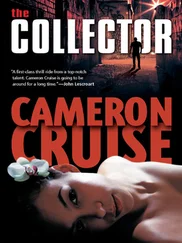I thought about the other costs involved in milling grain. Not only were there oil and electricity for the machines, trucks, venti-units, lights, and refrigerators, but there was all the water to grow the grain in the first place. Millions of hectares of farmland were devoted to corn, soybeans, wheat, and rye. The government built thousands of kilometers of aqueducts that took water from rivers halfway across the country and brought it to the farms. There were places in the desert that suddenly bloomed with vineyards and orange groves. Towns without water were transformed into green paradises where people played games on tracts of perfect grass. Entire cities sprang from dust and clay, their spires reaching into the sky and their roots deep into the earth. They sucked up water as if it were their birthright and spat out sewage back onto the land. There was no limit to Earth’s resources—until there wasn’t anything left anymore.
We hiked over and around machines as big as trucks. In every building the windows were shattered, and the walls were scoured of anything valuable. Floors and ceilings had collapsed, and splintered trusses lay everywhere. Some of the interior offices were intact, but they were completely empty of furniture, paneling, and anything else that would burn. The copper wiring had been stripped away, and the machines had ben robbed clean of fuel for use during the cold winters that followed.
The rear of the factory was open to the hills behind it. It was here that the trucks stopped to fill up with their loads of milled grain. There was a road that looped around the buildings, then made its way beneath a stack of elevators. The road was badly eroded—more sand and rock than concrete—but it was flat and clear of debris. We walked through the factory and out onto the road, then followed it until we came to a gully that cut the road in two. A short steel bridge had provided passage across, but it lay collapsed in the ditch, the victim of too many crossings and too much time.
“This way,” said Kai, stepping down into the ditch. He did not turn around and walked as if he knew where he was leading. It occurred to me then that this trip to explore the mill was not what it appeared: not a random wandering among the ruins, but a planned tour with a knowledgeable guide. Kai walked with purpose, navigating the rutted path like someone who had trudged there before. He released my hand and expected me to follow.
“Where are we going?”
“I want to show you a secret.”
We walked about five hundred meters down the gully, and then Kai climbed up the steep side away from the mill. There was no sound except our footsteps. No wind. No shade. Not a cloud in the sky. Everything was brown, burned, dried, or cracked.
“There,” he said. He was pointing to a nondescript patch of ground on which there was nothing but some gravel and broken glass.
“There, where?”
“Dig there,” he instructed.
I bent down and scratched at the dirt, which came away surprisingly easily in my fingers. It felt soft and slightly wet, as if it had just rained, which was impossible. I dug a little more quickly, and the dirt got wetter, which was definitely impossible.
“Kai?” I looked up at him. For the first time I felt something like fear. We were nearly a kilometer away from the nearest building, and twice that far from any living being. I realized there were so many things I didn’t know about this boy. How come we had never seen his father? How did his mother die? Why didn’t he go to school? All of his explanations suddenly seemed unbelievable. A boy didn’t just stop going to school with his father’s blessing or wander abandoned grounds as if he owned them. Eventually the government came to get him, or he went away. But Kai was still here, pointing at the earth.
“It’s okay,” he said. “Dig.”
I scooped deeper into the dirt, which began to come away in soggy lumps. “What is it?” I asked, although I already knew.
“Water,” he said.
“How did it get here?”
“There’s a spring underground. A small one. It runs right under the mill.”
I shook my head. I couldn’t believe there was fresh water so close to our home. Yet there it was, trickling through the sand in my fingers. As mysterious as Kai himself.
“Does anyone know?”
Kai shook his head slowly.
“Where…how did you find it?”
He shrugged. “I knew it was there.”
Kai’s face shone, and the gold in his hair refracted the sunlight. Finding a source of free water was like finding oil—better, even. It could make a person wealthy beyond imagination. But Kai didn’t seem to care. He regarded me with drowsy eyes below his bangs.
“You could be rich,” I said.
“There’s not even enough water to fill a cistern.”
“There might be.”
“There isn’t.”
I placed my fingers to my lips and tasted the water that came from the ground. It was sandy and gritty, but there was no chemical aftertaste and no brackish residue. I wasn’t worried about poisons or toxins, because I could tell it was real water, filtered deep in the earth. I scooped up another handful and let it wash over my face, closing my eyes as the drops cut cool rivulets down my cheeks.
At first I thought I was dreaming. And then I realized the lips on my own were Kai’s. He pressed against me, his warm breath washing my face like night. The air chopped and eddied, and I felt like I was falling into something deep and bottomless from which there could be no rescue. When I opened my eyes, his eyes were bright and large before me. “You shouldn’t,” I said.
“Sorry,” he said.
“Stop, I mean.”
I leaned back into him, and we kissed again. My lungs inhaled him, and his breath was my breath. We kissed until I was dizzy from it, and swirls of color patterned beneath my eyelids. When we stopped, the softness of his mouth lingered like buzzing. I touched my lips, and they felt warm and liquid—not at all like the dry chapped feeling of wind and sun. Kai’s gaze mirrored mine, and I looked back into his eyes as if I could see my own emotions reflected in them. They were a clear limpid blue, without a hint of gray.
We stood that way for a moment, eyes locked, hands clasped, and then he moved toward me. This time I stepped back, and his lips brushed my cheek.
“I’m sorry. I’m all confused,” I said. “I mean, it’s not like I don’t want to keep on, but I don’t—I don’t know what it means.”
Kai nodded as if he understood. Another boy might have pushed himself on me or tried to change my mind. Kai simply covered the small hole I had dug, patting the sand back into place. “Want to see the rest of the site?” he asked.
He took my hand, and we continued our tour of the dry hills and dusty grounds. He showed me the tiny lizards that lived deep in the sand and were able to withstand the winter. He pushed aside broken pilings and showed me colonies of ants that feasted off water in the decayed wood. But nothing else made any impression on me during the rest of our afternoon together at the old mill. Later I would regret not asking him more. Part of me wished we could go back to the moment before the kiss. He had become my closest friend—my only real friend besides Will, if I was honest—and I worried what would happen to that friendship if we kept on. But the other part of me felt old enough to continue. He was the first boy for whom I’d felt anything but curiosity, and I didn’t know then how to speak my mind about the things I wanted.
It was getting dark by the time we made our way to Kai’s building, and I knew my father would not want me cycling home. I called him from the lobby to pick me up. Kai apologized for not inviting me inside, but I understood. Germs spread more easily indoors, and it wasn’t worth alarming his neighbors.
Читать дальше
